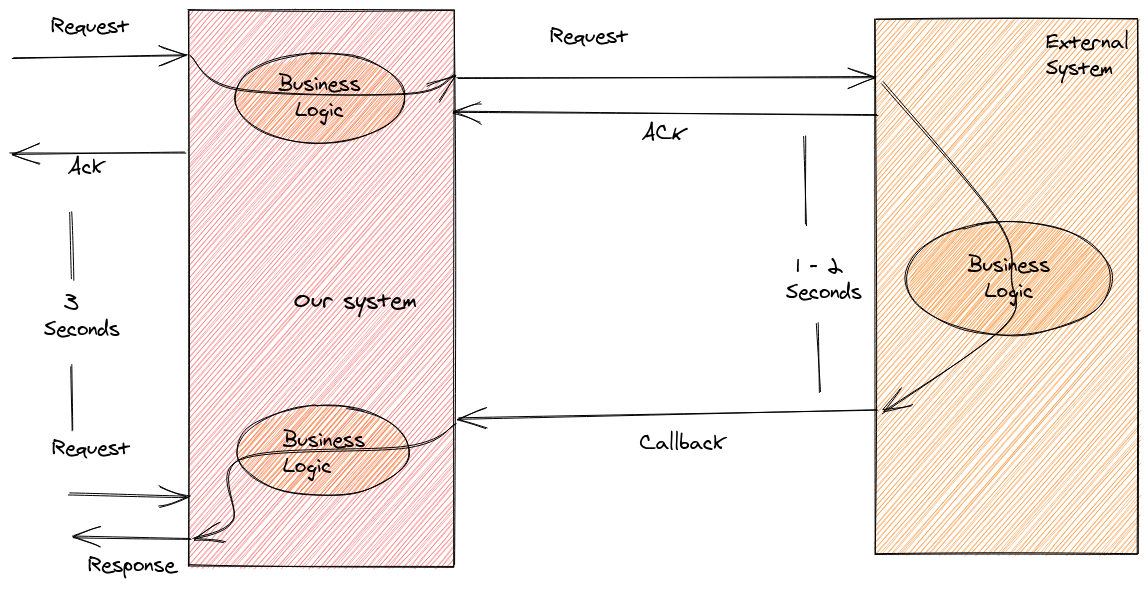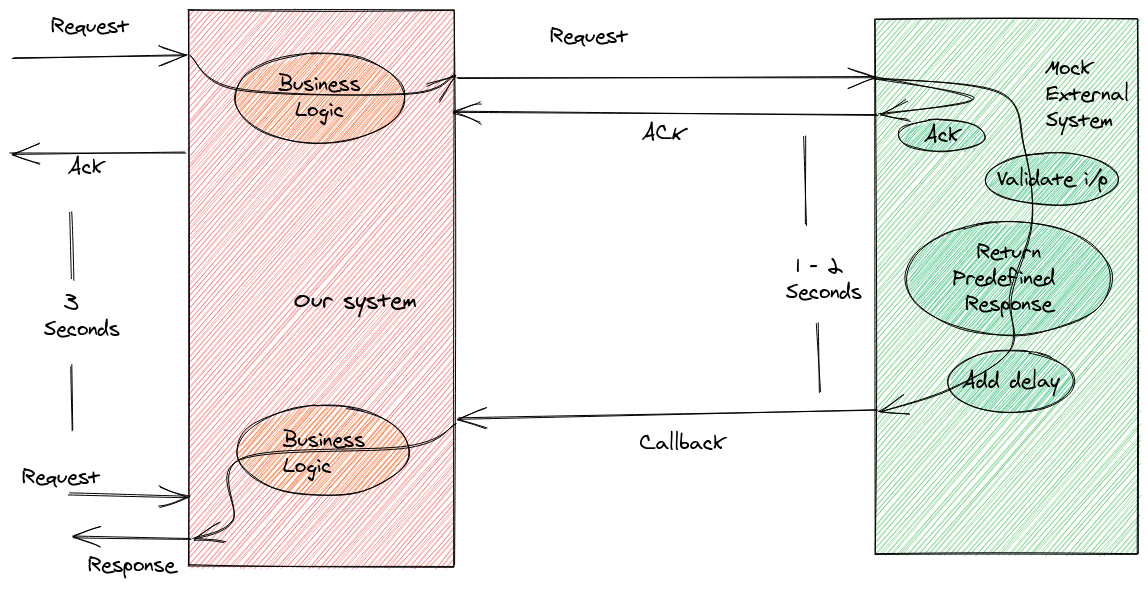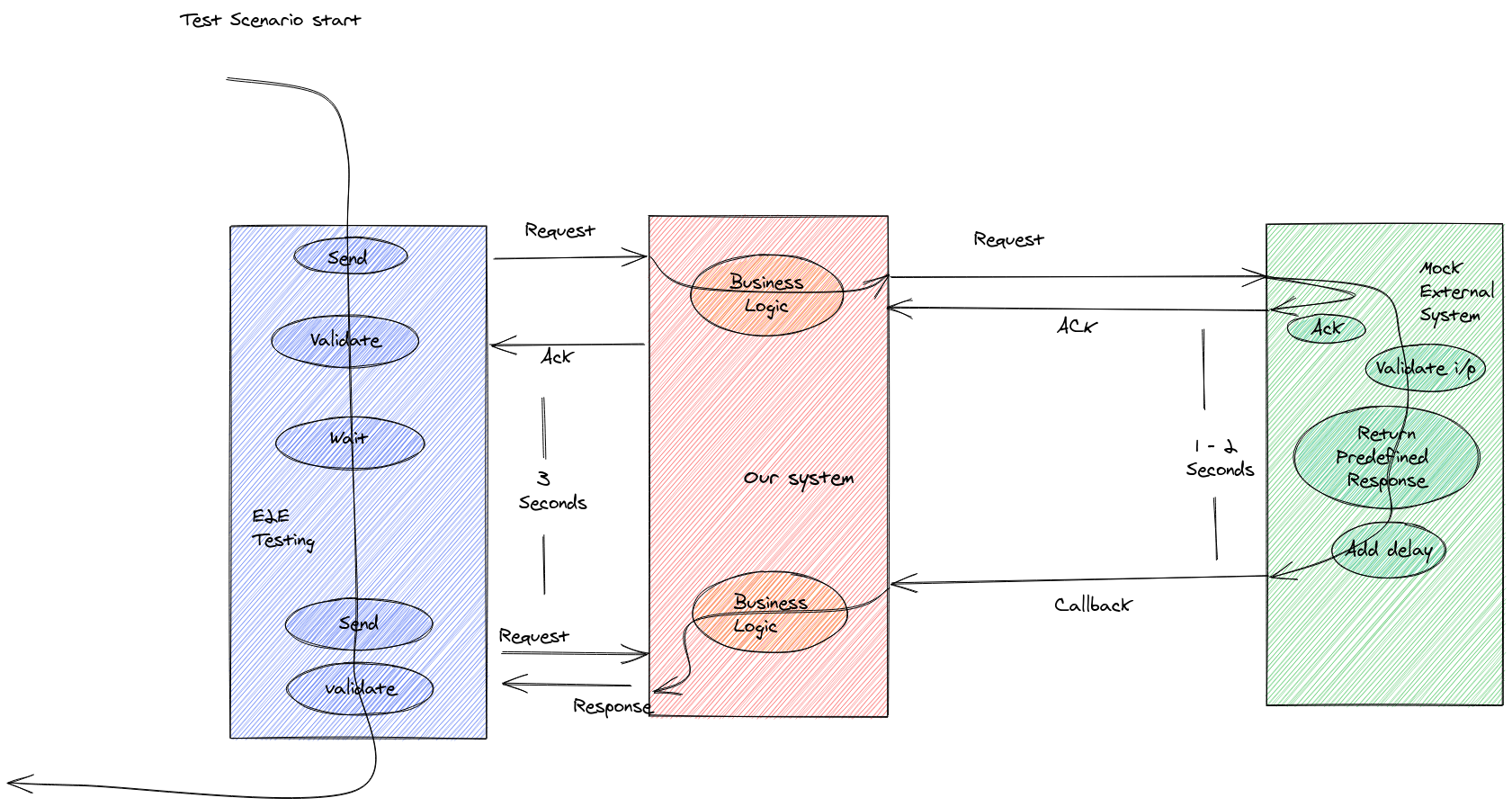Testing Async systems with Karate Testing Framework
I have love and hate relationship with asynchronous systems. I love them because the flow is natural and doesn't waste time and resources. I hate them because it's difficult to test and debug. The most common asynchronous system that you would have used is Webhook type. Where you get a callback from an external system when something happens and then you will handle it. That is straight forward. Because you just need to test your part.
Recently I have been working on a system that accepts the requests. Send the ACK message immediately but the real response comes as a callback sometime later. And that response can vary on your request and many other business scenarious. I wanted to setup an automated system to test our system end to end.

First thing I wanted to do, was to mock this external system. Replace it with an almost real webservice built using Karate's mock service.
Karate is the only open-source tool to combine API test-automation, mocks, performance-testing and even UI automation into a single, unified framework. The BDD syntax popularized by Cucumber is language-neutral, and easy for even non-programmers. Powerful JSON & XML assertions are built-in, and you can run tests in parallel for speed.
Test execution and report generation feels like any standard Java project. But there’s also a stand-alone executable for teams not comfortable with Java. You don’t have to compile code. Just write tests in a simple, readable syntax - carefully designed for HTTP, JSON, GraphQL and XML. And you can mix API and UI test-automation within the same test script.
Look at the example code mock-server.feature below
Feature: Service mock server
Background:
* def uuid = function(){ return java.util.UUID.randomUUID() + '' }
* configure responseHeaders = { "Content-Type": "application/json" }
* configure cors = true
Scenario: pathMatches('/service') && methodIs('POST')
* def response = read("responses/jsons/ack.json")
* def responseStatus = 200
* def tc = "test_case_1"
* def search = function(){java.lang.Thread.sleep(2000); karate.call("responses/features/service_callback.feature", {"req": request, "tc":"#(tc)"})}
* eval new java.lang.Thread(search).start()
Scenario: pathMatches('/search') && methodIs('GET')
* def responseStatus = 404
This is the main mock service provider. When started it serves at /service and POST only. As soon as it receives a request. It responds with an ACK message which are the contents of responses/jsons/ack.json
And then it sleeps for about 2 seconds. And calls another Karate feature responses/features/service_callback.feature. Which uses the parameters in the request to respond appropriately. It basically calls responses/jsons/service.json and passes the values from the request to it.
Feature: service response
Scenario: Case1: good response
karate.log("CALLBACK case 1 response")
def req = #(req)
def tc = #(tc)
Given url "http://localhost:5000"
Given path "callback"
Given request read("responses/jsons/service.json")
Given header Accept = "application/json"
Given header Content-Type = "application/json"
And header "X-API-Key" = api_key
When method post
Then status 200
The service json is parameterized or its a template
{
"transaction_id": "#(req.transaction_id)",
"message_id": "#(req.message_id)",
"timestamp": "2020-08-19T06:41:54.079868Z",
"version": "#(req.version)",
"resposne" : "#(req.message)"
}
You can see here responses/jsons/service.json uses the values from the request req so it can send respond appropriately. I have not shown the usage of tc. Idea is to pass the test-case number so it can send appropriate response accordingly.
Starting the mock server is very straight forward.
#start the mock server on port 8080
java -jar ../karate.jar -p 8000 -m mock-server.feature -w

Then I wrote a regular testing feature in karate to test our system. So finally the whole End to End testing system looked like this.

Feature: This is will test the /request call. Call get_request_details to see if you have got response. Delay is 15 seconds
Background:
* def api_key = "1245"
* def pause = function(){ java.lang.Thread.sleep(15000); return 1; }
* def uuid = function(){ return java.util.UUID.randomUUID() + '' }
Scenario: Case: on_search good response
Given url "http://localhost:5000"
Given path "request"
Given header X-API-Key = api_key
Given header Accept = "application/json"
Given header Content-Type = "application/json"
Given def transaction_id = uuid()
Given def message_id = uuid()
Given def version = uuid()
Given def message = "Coming to you Async"
Given request read("../jsons/request.json")
When method post
Then status 200
#wait
Then def x = pause()
Given url "http://localhost:5000"
Given path "get_request_details"
Given header X-API-Key = api_key
Given request read("../jsons/get_request_details.json")
Given header Accept = "application/json"
Given header Content-Type = "application/json"
When method post
Then status 200
Then assert response.transaction_id == transaction_id
Then assert response.message == message
Here the calback is through webhook. But it could have been a Queue based too. You get the idea. I have been enjoying E2E testing using Karate framework. It has a lot of hidden gems. I will blog more about them as we test this system. Let me know what do you use test such systems.










Looking to do something very similar and this has helped a lot – thank you. Thought I would point out you have a typo, you comment that mock server is started on port 8080 but the command is actually using port port 8000.
haha, funny that I have a typo when pointing out your typo
How we do we check this in real time scenario, with out mock?